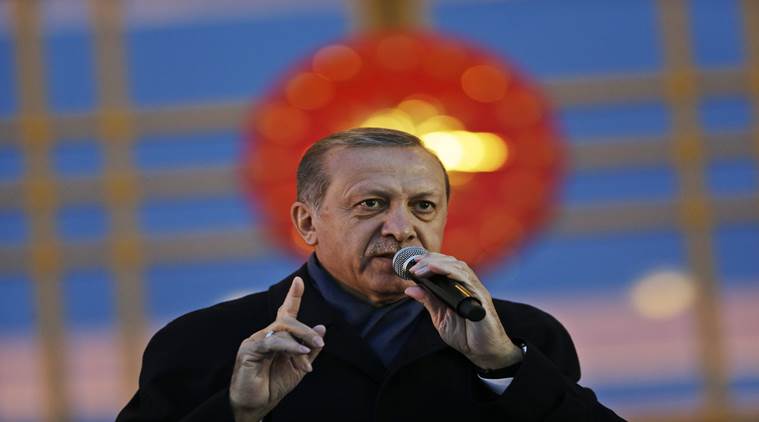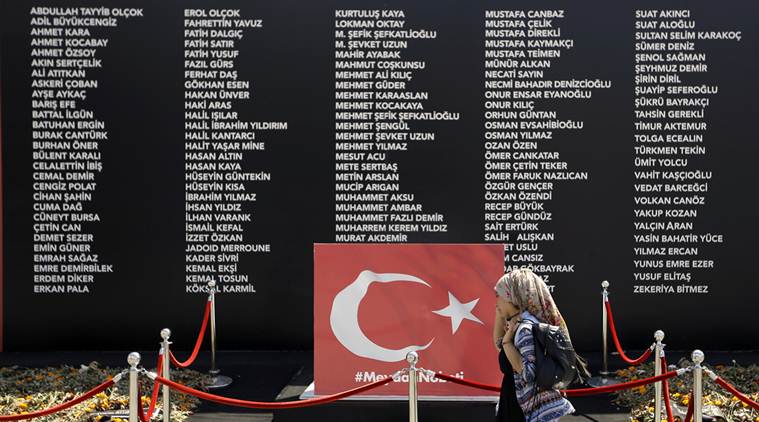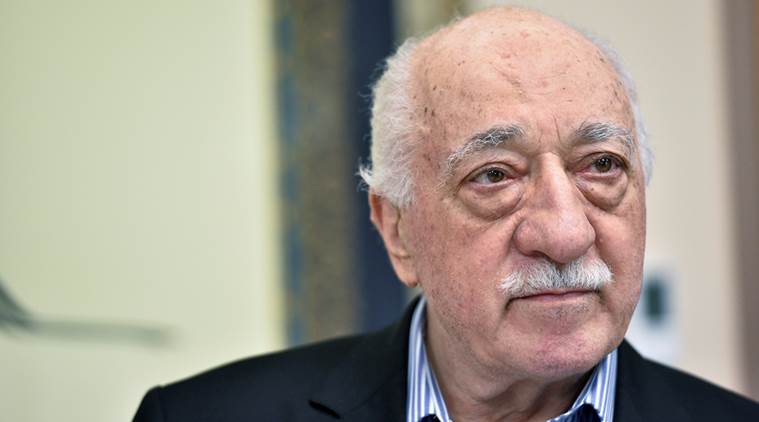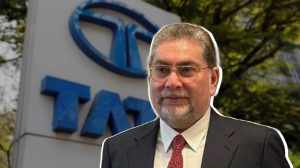Stay updated with the latest - Click here to follow us on Instagram
How Turkish coup led to Recep Tayyip Erdogan tightening his grip over Turkey
A recap of the events that lead to a change in the power centres in Turkey.
 Turkey’s President Recep Tayyip Erdogan, gestures while delivering a speech during a rally of supporters a day after the referendum, outside the Presidential Palace, in Ankara, Turkey, Monday, April 17, 2017. (Source: AP Photo/Burhan Ozbilici)
Turkey’s President Recep Tayyip Erdogan, gestures while delivering a speech during a rally of supporters a day after the referendum, outside the Presidential Palace, in Ankara, Turkey, Monday, April 17, 2017. (Source: AP Photo/Burhan Ozbilici)
Two weeks after winning the referendum that will grant the president sweeping powers in 2019, Turkish President Recep Tayyip Erdoğan arrived in India on a two-day state visit. Erdoğan has been at the centre of a dramatic string of events over the last one year. Ever since the failed military coup, he has succeeded in tightening his grip over the country.
The coup d’etat
Members of the Turkish military plotted a military coup d’etat against Erdoğan in what was touted as a move to rescue Turkey from his harsh dictatorial policies. The rebellion, which happened in July 2016, failed to overthrow Erdogan and his government. For several decades, the Turkish military has intervened time and again in the country’s politics, carried out coups in the past and played a significant role in shaping Turkey as we know it. Despite the formidable reputation of the Turkish military, its coup attempt was unsuccessful. At least 200 people were killed and nearly 1,400 people were left injured during the coup attempt that took place overnight. In Istanbul, soldiers blocked key routes and in capital Ankara, fighter jets and helicopters did rounds.
 A pedestrian passes a sign commemorating people who died fighting the July 15th coup at Taksim Square in Istanbul. (AP Photo| Thanassis Stavrakis)
A pedestrian passes a sign commemorating people who died fighting the July 15th coup at Taksim Square in Istanbul. (AP Photo| Thanassis Stavrakis)
An army faction used the state broadcaster to announce that the military had seized power in the country to “protect democracy” from Erdogan. The president, who was holidaying in a seaside resort, returned to Istanbul and called on his followers to take to the streets and protest. A violent night ensued and TV stations were raided by troops; the parliament and president’s house were attacked. Subsequently, a military chopper was shot down and the chief of the Turkish military was taken hostage. The conspirators neither found support in the military nor the public. Ultimately, the rebel troops had to drop their weapons and surrender.
False flag attack?
Several questions were raised as to why the coup failed, with some even alleging it was staged by Erdogan to consolidate his support and claim greater standing than the military. Fethullah Gulen was also among the leading critics. The Turkish government had accused Gulen, who is a US-based Muslim cleric, for causing unrest in the country. Both sides denied allegations. At the same time, 6,000 men including top-ranking officers of the military and several judges were arrested on orders of Erdogan.
 Thousands of people attend a Democracy and Martyrs’ Rally in Istanbul, Sunday, Aug. 7, 2016. Crowds are gathering in Istanbul for a massive rally to mark the end of nightly democracy demonstrations following Turkey’s abortive July 15 coup that killed over 270 people. (AP Photo/Emrah Gurel)
Thousands of people attend a Democracy and Martyrs’ Rally in Istanbul, Sunday, Aug. 7, 2016. Crowds are gathering in Istanbul for a massive rally to mark the end of nightly democracy demonstrations following Turkey’s abortive July 15 coup that killed over 270 people. (AP Photo/Emrah Gurel)
Erdogan has faced a lot of flak for his brand of politics, including from the military. The Turkish military has carried out four successful coups since 1960. Its stingy relationship with Erdogan’s Justice Development Party is also well documented. International actors stepped in to urge the military and the government to respect the democratic institutions in the country, but the course laid out for the country was completely opposite. The European Union and NATO had massive interests in Turkey’s stability. The country was a major member of the NATO alliance and was a partner with EU to solve the Syrian migrant crisis.
It was later reported that the coup was attempted by the Peace at Home Council — a faction of Turkish armed forces. The reasons detailed for the coup attempt were Erdogan’s apathy towards human rights, the rise of the ‘Deep State’, dent to democracy and his foreign policy that hurt Turkey’s international standing.
In the purge that followed, 40,000 people were arrested including 10,000 soldiers and 3,000 judges. Licenses of 20,000 private teachers were canceled and 15,000 education staff was suspended. Allegations emerged that Erdogan wanted to indoctrinate the public and teach his own version of history and values. At least 2,000 journalists have been slapped with charges of insult to the President which is an indictable offence.
 FILE PHOTO: U.S. based cleric Fethullah Gulen at his home in Saylorsburg, Pennsylvania, U.S. July 29, 2016. REUTERS/Charles Mostoller/File photo
FILE PHOTO: U.S. based cleric Fethullah Gulen at his home in Saylorsburg, Pennsylvania, U.S. July 29, 2016. REUTERS/Charles Mostoller/File photo
Gulen questioned that despite having a history of successful coups, why did the 2016 one have basic shortcomings. It didn’t target Erdogan or any high ranking ministers and government officials. Ministers issued statements on radio and TV within hours of the beginning of the coup attempt and no airports or key transportation hubs were secured, not to mention the failure in courting public support. Erdogan’s plane was not intercepted and his palace worth at least $700 million was not attacked. Gulen, accused by Erdogan of being the key conspirator, alleged that it was a staged coup.
The crackdown
Whatever were the reasons Erdogan emerged more popular than before the coup. The thing going for him is that during his terms as prime minister during 2003-14, the living standard in the country did actually go up. It was a period of economic boom. Most of the public still remembers that. However, after he won the presidential election in 2014, his approach was more authoritarian.
After the failed coup, the press was censored. Erdogan took the national media largely under his control. Political adversaries were put in jail and protests were stamped out. His Islamic rhetoric has also increased many folds after the coup and his increased intervention in the education system seems to be a classic case of the dictatorial practice of indoctrinating countrymen.
Still, a popular idea in Turkey saved Erdogan’s position. “The worst democracy is better than no democracy”. Still, democracy is not the same as being liberal in Turkey and protests are not a welcome sight. Weighing all options, the citizens chose Erdogan, the most powerful leader since country’s founding in 1923 by Mustafa Kemal Ataturk.
Now, the country is reeling under a debt crisis. At least three million Syrian refugees have poured into the country. Turkey is more polarised religiously and politically than ever before. The EU membership hopes are all but done and dusted.
Erdogan proposed a referendum that would vastly increase his powers and accordingly, as he argues, will centralise power owing to the need of time for bringing stability in the country. He won the referendum which had proposed scrapping the position of prime minister, creation of vice president position, ending presidential neutrality, powers to enact laws by decree and also to dissolve parliament. Come 2019, the Parliament will no longer be empowered to scrutinise ministers and have limited powers to investigate or impeach the president.
Erdogan won the referendum with nearly half the voters supporting him. However, Erdogan has moved to impose a series of bans including curbs on freedom of expression. Erdogan has banned Wikipedia and specific websites and web pages citing national security. He has also banned TV dating shows among others.
- 01
- 02
- 03
- 04
- 05






























